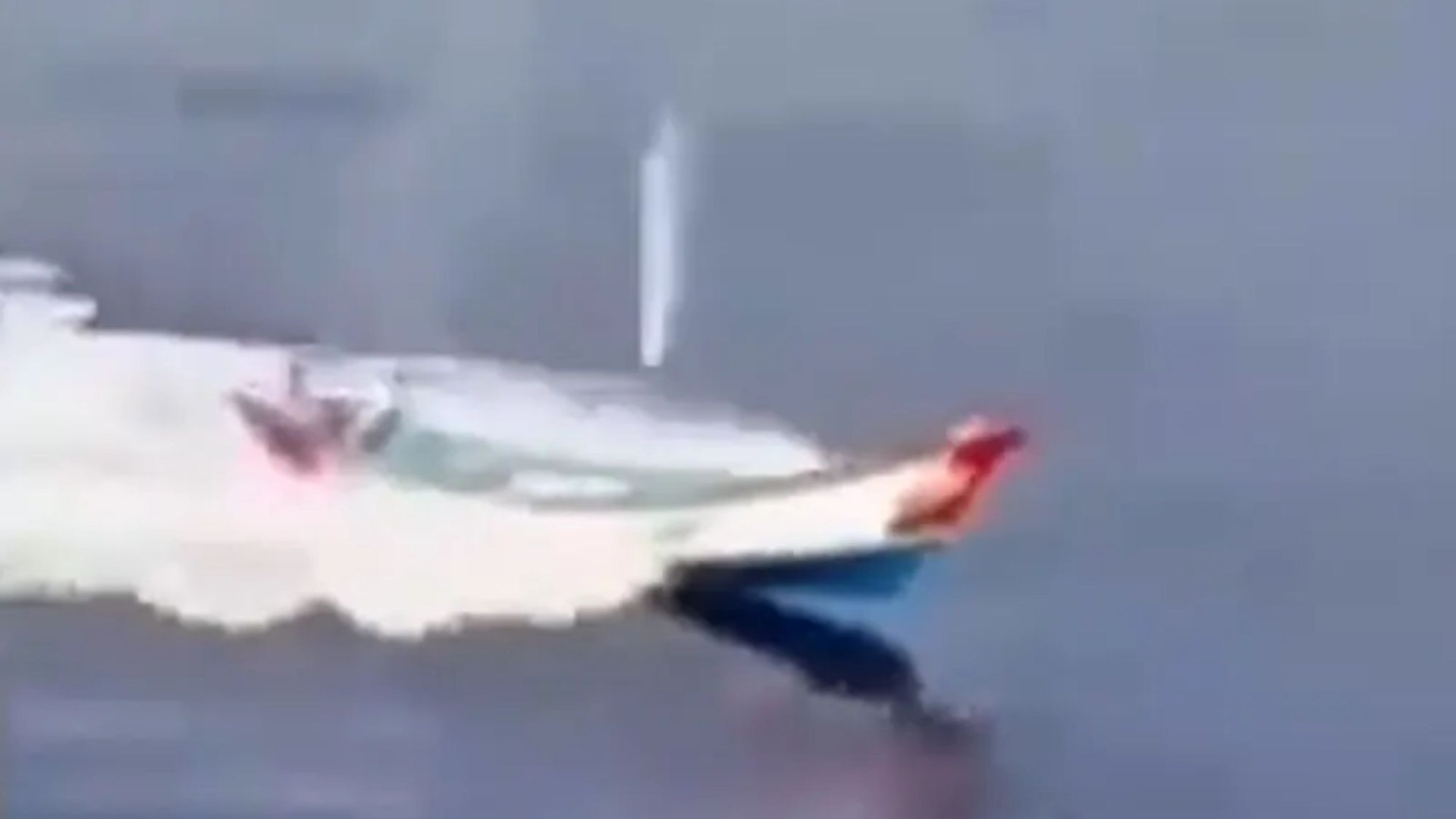HEART-stopping footage shows armed guards on a British ship desperately firing at a bomb-laden Houthi drone boat.
But they fail to intercept it before it smashes into the hull and triggers a huge explosion.
7

7

7

7

7
Yemen’s Houthi rebels targeted British oil tanker Cordelia Moon on Tuesday in the Red Sea around 110km off the port city of Hodeidah.
The Iran-backed militia said eight ballistic and winged missiles, a drone, and an unmanned surface boat were used in the strike.
Dramatic footage taken on board the Cordelia Moon shows armed guards frantically open fire on the kamikaze boat as it glides towards the ship.
It then hits the hull – and a massive blast can be heard.
Another shocking clip – shared by the Houthis – shows the moment the explosion ripped through the ship.
The blast damaged the port side tank and sent plumes of thick, black smoke into the air.
A second ship heading for Suez was struck around 97 nautical miles northwest of Hodeidah, according to British security company Ambrey.
The crews of both vessels reported being safe.
Houthi rebels have been persistently terrorising ships in the Red Sea since Hamas’ barbaric attack on Israel last year on October 7.
The Houthis, Hamas and Hezbollah are part of the Iran-led Axis of Resistance – which also includes armed groups in Syria and Iraq.
Terror proxies like these carry out Iran’s dirty work while bosses in Tehran act like puppet-masters.
Houthi terrorists have fired missiles and drones at Israel and disrupted Red Sea shipping for months in support of Hamas.
It has drawn a retaliation in a cycle that has repeatedly threatened to set off a wider war.
Overnight, Houthi rebels said they launched two drones at Tel Aviv overnight.
The military said it identified two drones off the coast of the bustling metropolitan area, shooting one of them down while the other fell in the Mediterranean Sea.
These latest attacks come after the Houthis on Monday threatened “escalating military operations” against Israel following the apparent downing of an American military drone over Yemen by their forces.
On Sunday, oil tanks in Yemen exploded in a massive fireball as Israel bombed the Houthi rebels in revenge strikes.
Footage showed the gigantic fireball rip shoot into the sky after IDF jets hit the fuel while it was being stored at a port.
Who are the Houthis?

THE Houthi rebels have spent months terrorising the Red Sea by launching persistent missile and drone attacks on vessels and warships – but who are they?
The Shia militant group who now controls large swaths of Yemen spent over a decade being largely ignored by the world.
However, since the outbreak of the Israel-Hamas war they sprung from relative obscurity to holding roughly £1trillion of world trade hostage – turning one of the world’s busiest shipping lanes into an active warzone.
Their warped battle cry is “Death to America, Death to Israel, curse the Jews and victory to Islam”.
Why are they attacking ships?
In October, the rebel group began launching relentless drone and missile attacks on any ships – including warships – they deem to be connected with Israel in solidarity with their ally Hamas.
In reality, they targeted commercial vessels with little or no link to Israel – forcing global sea traffic to largely halt operations in the region and sending shipping prices around the world soaring.
The sea assaults added to the carnage in the Middle East tinderbox as intense ripples from Israel’s war in Gaza were felt across the region – with Iran accused of stoking the chaos.
The Houthi chiefs pledged their Red Sea attacks would continue until Israel stopped its offensive in Gaza.
The group’s chiefs have previously said their main targets are Israel, and its allies the US and Britain.
And despite repeated threats from the West and joint US and UK strikes blitzing their strongholds in Yemen – Iran’s terror proxy appears undeterred.
It then dissipated into black smoke in the sky but a massive blaze continued to burn at the port and secondary strikes erupted.
Four were reportedly killed and 33 injured, local media said.
Israel’s strikes were a retaliation against the militants after they launched rockets at Israel in the days before.
Now the Middle East once again is teetering on the brink of all-out war after Iran’s missile attack on Israel on Tuesday.
Tehran said the 181 missile blitz was in retaliation for the assassination of Hezbollah’s leader Hassan Nasrallah and Hamas chief Ismail Haniyeh.
He was killed in an explosion in Iran’s capital in July that was widely blamed on Israel.
Israel and the US have vowed there will be severe consequences for the attack.
Furious Israeli PM Netanyahu warned: “Iran made a big mistake tonight and it will pay for it.”
And Israel has warned more civilians in southern Lebanon to urgently evacuate as it continues its ground campaign against Hezbollah.
The focus of the operation is clearing out Hezbollah terror sites to halt rocket attacks which have driven 60,000 from homes in Northern Israel in the last 11 months, Israeli sources said.
G7 leaders have renewed calls to end hostilities in the region, warning of a “dangerous cycle of attacks and retaliation” leading to “uncontrollable” escalation and bolstered their condemnation of Iran.
They have discussed co-ordinated efforts to avoid escalation in the area and said they would “continue to be in close contact with all actors”.

7

7




